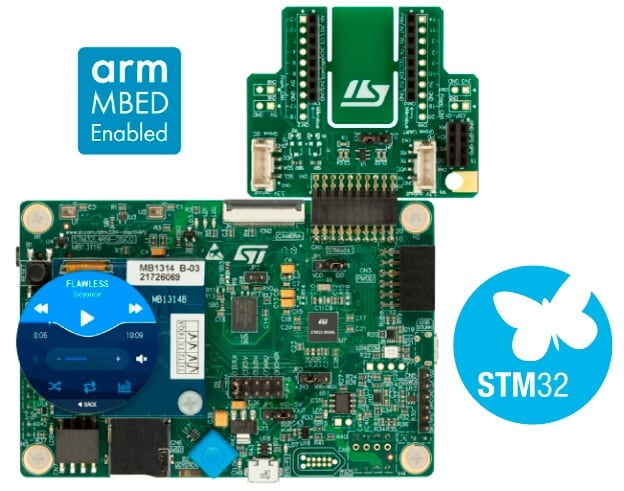ST STM32L4R9I Discovery
Overview
The 32L4R9IDISCOVERY Discovery kit is a complete demonstration and development platform for STMicroelectronics Arm® Cortex®-M4 core-based STM32L4R9AI microcontroller.
Leveraging the innovative ultra-low-power oriented features, 640 Kbytes of embedded RAM, graphics performance (Chrom-ART Accelerator), and DSI controller offered by the STM32L4R9AI, the 32L4R9IDISCOVERY Discovery kit enables users to easily prototype applications with state-of-the-art energy efficiency, as well as stunning audio and graphics rendering with direct support for AMOLED DSI round LCD display.
For even more user-friendliness, the on-board ST-LINK/V2-1 debugger provides out-of-the-box programming and debugging capabilities.

More information about the board can be found at the STM32L4R9I-DISCOVERY website. More information about STM32L4R9 can be found here:
Supported Features
The current Zephyr stm32l4r9i_disco board configuration supports the following hardware features:
Interface |
Controller |
Driver/Component |
|---|---|---|
NVIC |
on-chip |
nested vector interrupt controller |
UART |
on-chip |
serial port-polling |
PINMUX |
on-chip |
pinmux |
GPIO |
on-chip |
gpio |
FLASH |
on-chip |
on-chip flash memory; external OctoSPI memory |
ADC |
on-chip |
ADC Controller |
RTC |
on-chip |
Real Time Clock |
I2C |
on-chip |
i2c |
SPI |
on-chip |
spi |
PWM |
on-chip |
pwm |
SDMMC |
on-chip |
sd/mmc |
Other hardware features are not yet supported on Zephyr porting.
The default configuration can be found in the defconfig file:
Pin Mapping
For more details, please refer to STM32L4R9I-DISCOVERY website.
System Clock
The STM32L4R9AI System Clock can be driven by an internal or external oscillator, as well as by the main PLL clock. By default, the System clock is driven by the PLL clock at 120MHz. PLL clock is driven by a 4MHz medium speed internal clock.
Serial Port
The STM32L4R9I Discovery board has up to 6 U(S)ARTs. The Zephyr console output is assigned to UART2, which is connected to the onboard ST-LINK Virtual COM port interface. Default communication settings are 115200 8N1.
Programming and Debugging
The STM32L4R9I Discovery board includes an ST-LINK/V2-1 debug tool.
Applications for the stm32l4r9i_disco board configuration can be
built and flashed in the usual way (see Building an Application
and Run an Application for more details).
Flashing
The board is configured to be flashed using west STM32CubeProgrammer runner, so its installation is required.
Alternatively, OpenOCD or JLink can also be used to flash the board using
the --runner (or -r) option:
$ west flash --runner openocd
$ west flash --runner jlink
Flashing an application to STM32L4R9I Discovery
Connect the STM32L4R9I Discovery to your host computer using the ST-LINK USB port, then run a serial host program to connect with the board. For example:
$ minicom -b 115200 -D /dev/ttyACM0
You can then build and flash applications in the usual way. Here is an example for the Hello World application.
# From the root of the zephyr repository
west build -b stm32l4r9i_disco samples/hello_world
west flash
You should see the following message in the serial host program:
$ Hello World! stm32l4r9i_disco
Debugging
You can debug an application in the usual way. Here is an example for the Hello World application.
# From the root of the zephyr repository
west build -b stm32l4r9i_disco samples/hello_world
west debug
